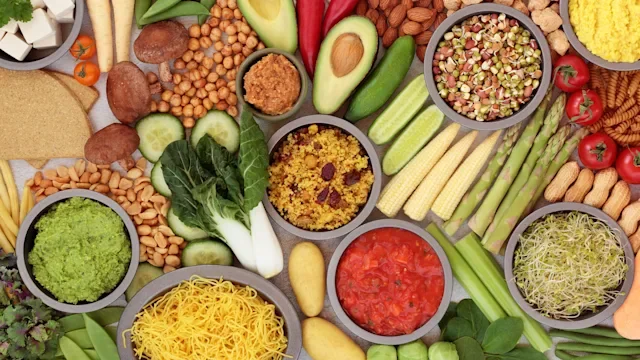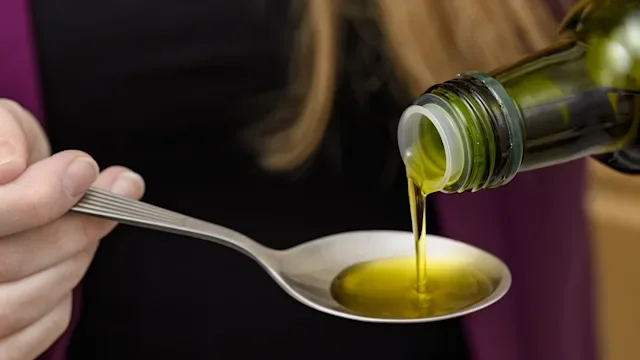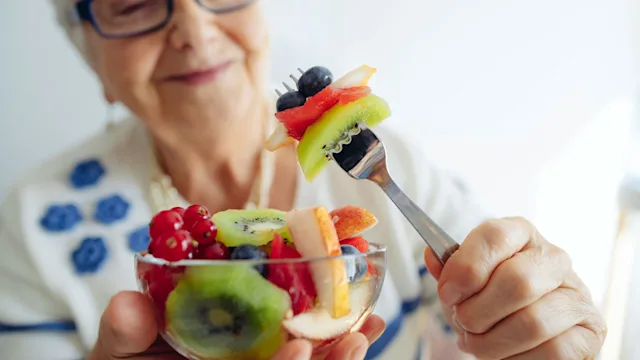Key takeaways:
Stevia is a natural sweetener made from the stevia plant. The stevia leaf extract that’s available in grocery stores and used in foods is considered safe.
Stevia is similar to artificial sweeteners in that it doesn’t have calories or sugar. But based on research so far, it’s associated with fewer health risks.
Some stevia products contain fillers and ingredients that you may be trying to limit or avoid. So, always be sure to read the label.
There are many options for sweetening your food and drinks if you’re trying to avoid regular table sugar. And these different types of sweeteners are becoming more popular. If you’re looking for a natural, no-calorie sweetener, stevia might be a good option for you. Here, we compare stevia to table sugar and other common sweeteners, and discuss its potential health risks and benefits.
What is stevia?
Stevia is a natural sweetener that comes from a plant called Stevia rebaudiana. It’s a member of the sunflower (Asteraceae) family.
The term “stevia” may be used to describe the sweetener in a few different forms. This can be confusing because there’s some overlap in the terminology. Here are some common forms of stevia and what each is made of:
High-purity stevia leaf extract: This is what you’ll find sold in grocery stores. This is also the only form of stevia used in processed foods and drinks. High-purity stevia leaf extract contains 95% or greater steviol glycosides, the natural compounds present in the plant’s leaf.
Whole plant or “raw” stevia: This is also known as Stevia rebaudiana Bertoni. This form of stevia isn’t approved for use in the U.S., as it hasn’t been adequately tested for safety.
Stevia extract: This is made from steeping the leaves of the plant in water to extract the sweet compounds into the liquid.
For the purposes of this article, the word “stevia” refers to high-purity stevia leaf extract. This is the version of stevia that most people are familiar with.
Is stevia safe?
Pure stevia is a safe food product. Consuming it in moderation doesn’t pose significant health risks. The FDA categorizes stevia as “generally recognized as safe” (GRAS). But sometimes stevia is combined with other additives or sugar alcohols to increase its bulk and sweetness. Those ingredients can come with some associated risks.
What are the risks and side effects of consuming stevia?
Consuming pure stevia in moderation is unlikely to cause side effects. But when stevia products contain other additives and sweeteners, they can cause health effects, including:
Increase in blood sugar levels: Pure stevia has a glycemic index of near 0. This means that it has little to no effect on your blood sugar level. But if stevia is combined with additives like maltodextrin and dextrose, it can raise a person’s blood sugar. This is especially important for people with health conditions like diabetes.
Increased risk of heart attack and stroke: Sometimes stevia is combined with erythritol, a sugar alcohol that’s been linked to an increase in heart attack and stroke.
Digestive issues: Sometimes stevia contains sugar alcohols like xylitol. These sugar alcohols can cause upset stomach and diarrhea.
This is why it’s important to check the package before assuming you’re consuming pure stevia. Note that some studies suggest that even pure stevia may have an impact on the healthy bacteria naturally found in a person’s gut.
Does stevia have any health benefits?
More research is needed to understand stevia’s long-term effects. But some research suggests that stevia may have potential health benefits.
Insulin and blood sugar levels
In a study of people with diabetes, drinking tea sweetened with stevia didn’t raise blood sugar levels. It also didn’t change hemoglobin A1C, a measure of your average blood glucose level over 3 months. So, stevia may be a good sugar substitute for people trying to manage their blood sugar.
Is natural sugar better than refined sugar? Yes, because natural sugar is found in foods that also deliver important nutrients. But it’s important to try and limit all sugar intake.
The best natural sweeteners: The best one for you depends on your health, taste preferences, and how you plan to use it. Some, like honey and molasses, even have health benefits.
Do artificial sweeteners cause cancer? No. Here, we review the research on aspartame, saccharine, and other artificial sweeteners.
How to cut back on sugar: Small, gradual diet adjustments can help you reduce your sugar intake. Instead of doing a strict “detox,” it’s best to find a long-term, sustainable approach.
Blood pressure
Stevia may have benefits for blood pressure. In one study, people who took 500 mg of stevia powder daily for 2 years saw a decrease in blood pressure. Systolic blood pressure levels (the top number) decreased by about 10 mmHg. Diastolic blood pressure (the bottom number), decreased about 6 mmHg. But a larger review of several studies saw a small decrease in diastolic levels only.
Cancer
For a long time, many people thought that artificial sweeteners were linked to cancer — but this hasn’t included stevia. (And several studies have since shown that there may not actually be a link between artificial sweeteners and cancer.)
When it comes to stevia, test tube and animal studies suggest that stevia may actually inhibit the growth of cancer cells. But without further studies, it’s too early to tell if this is true in humans.
Read more like this
Explore these related articles, suggested for readers like you.
Kidney health
In a study of people with early-stage chronic kidney disease (CKD), participants took 250 mg of stevia daily. After 3 months, their blood markers reflected improved kidney function. To date, there are no other human studies on stevia and kidney function.
Metabolic dysfunction-associated steatotic liver disease (MASLD)
Stevia may help prevent metabolic dysfunction-associated steatotic liver disease or MASLD (formerly called “nonalcoholic fatty liver disease,” or NAFLD). But all of the research to date has been done in animals. So, it’s too early to know if this benefit applies to humans.

How does stevia compare to sugar?
Stevia tastes up to 400 times sweeter than standard table sugar. But it may be better for your health. Eating more than the recommended amount of refined sugar has been linked to serious health conditions, including:
How does stevia compare to artificial sweeteners?
You may be wondering how stevia compares to artificial sweeteners, which also have very few calories. Common artificial sweeteners include:
Aspartame, often sold as the brand Equal
Saccharin, sold as Sweet’N Low
Sucralose, which you may know better as Splenda
The key difference between stevia and these other sweeteners is that stevia is a natural sweetener. It comes from a plant. Artificial sweeteners, on the other hand, are all made by modifying the sugar molecule in a lab.
The following table highlights some of the key differences between stevia and artificial sweeteners.
| Sweetener | Sweetness (compared to table sugar) | Calories per packet | Is it an artificial sweetener? | Possible health risks |
|---|---|---|---|---|
| Stevia | 200 to 400 times sweeter | 0 | No |
|
| Aspartame (Equal) |
200 times sweeter | 3.65 | Yes |
|
| Saccharin (Sweet’N Low) |
200 to 700 times sweeter | 3.6 | Yes | |
| Sucralose (Splenda) |
600 times sweeter | 3.36 | Yes |
|
It’s still unclear how artificial sweeteners affect long-term health. But so far, stevia appears to be safer.
Frequently asked questions
The FDA banned stevia in 1991 over concerns of a possible connection to cancer. But the FDA changed its stance over time as more research on stevia became available. In 2008, the FDA granted 95% pure stevia extract “generally recognized as safe” (GRAS) status. Today high-purity stevia is no longer banned in the U.S. It’s used not only in food and drinks, but also in toothpaste, medicines, and chewing gums. Note that stevia leaves and crude stevia extracts (versions of stevia that don’t meet “pure extract” standards) aren’t considered GRAS.
There are limited clinical studies on the effects of consuming non-nutritive sweeteners (NNS) like stevia during pregnancy. But many healthcare organizations consider stevia safe to use during pregnancy. Unlike artificial sweeteners like saccharin and aspartame, stevia extracts come from plants.
The FDA banned stevia in 1991 over concerns of a possible connection to cancer. But the FDA changed its stance over time as more research on stevia became available. In 2008, the FDA granted 95% pure stevia extract “generally recognized as safe” (GRAS) status. Today high-purity stevia is no longer banned in the U.S. It’s used not only in food and drinks, but also in toothpaste, medicines, and chewing gums. Note that stevia leaves and crude stevia extracts (versions of stevia that don’t meet “pure extract” standards) aren’t considered GRAS.
There are limited clinical studies on the effects of consuming non-nutritive sweeteners (NNS) like stevia during pregnancy. But many healthcare organizations consider stevia safe to use during pregnancy. Unlike artificial sweeteners like saccharin and aspartame, stevia extracts come from plants.
The bottom line
Stevia can be a good alternative to table sugar since it doesn’t contain any calories or sugar. It’s generally considered safe to consume, and may have fewer health risks than artificial sweeteners like saccharin, aspartame, and sucralose. Stevia may also offer some benefits in regard to blood sugar and blood pressure control. Always be sure to check the label. Some stevia products add sugar alcohols or other fillers, and these additives can cause side effects.

Why trust our experts?



References
Ajami, M., et al. (2020). Effects of stevia on glycemic and lipid profile of Type 2 diabetic patients: A randomized controlled trial. Avicenna journal of phytomedicine.
American Cancer Society. (2023). Aspartame and cancer risk.
Ashwell, M. (2015). Stevia, nature’s zero-calorie sustainable sweetener: A new player in the fight against obesity. Nutrition Today.
Azeez, O. H., et al. (2019). Long-term saccharin consumption and increased risk of obesity, diabetes, hepatic dysfunction, and renal impairment in rats. Medicina.
Brigham and Women’s Hospital. (n.d.). Substances of concern during pregnancy.
Choudhary, A. K., et al. (2018). Neurophysiological symptoms and aspartame: What is the connection? Nutritional Neuroscience.
Debras, C., et al. (2022). Artificial sweeteners and risk of cardiovascular diseases: Results from the prospective NutriNet-Santé cohort. BMJ.
del Pozo, S., et al. (2022). Potential effects of sucralose and saccharin on gut microbiota: A review. Nutrients.
Figlewicz, D. P., et al. (2009). Effect of moderate intake of sweeteners on metabolic health in the rat. Physiology & Behavior.
FoodData Central. (2019). Sweeteners, tabletop, aspartame, Equal, packets. U.S. Department of Agriculture.
FoodData Central. (2019). Sweeteners, tabletop, saccharin (sodium saccharin). U.S. Department of Agriculture.
FoodData Central. (2019). Sweeteners, tabletop, sucralose, Splenda packets. U.S. Department of Agriculture.
Ghusn, W., et al. (2023). The impact of artificial sweeteners on human health and cancer association: A comprehensive clinical review. Cureus.
Harvard Health Publishing. (2022). The sweet danger of sugar.
Hsieh, M., et al. (2003). Efficacy and tolerability of oral stevioside in patients with mild essential hypertension: A two-year, randomized, placebo-controlled study. Clinical Therapeutics.
Iatridis, N., et al. (2022). Anti-cancer properties of Stevia rebaudiana; More than a sweetener. Molecules.
Kakleas, K., et al. (2020). Nonalcoholic fatty liver disease, insulin resistance, and sweeteners: A literature review. Expert Review of Endocrinology & Metabolism.
Mäkinen, K. K. (2016). Gastrointestinal disturbances associated with the consumption of sugar alcohols with special consideration of xylitol: Scientific review and instructions for dentists and other health-care professionals. International Journal of Dentistry.
MedlinePlus. (2023). Phenylketonuria.
National Cancer Institute. (2023). Artificial sweeteners and cancer.
Onakpoya, I. J., et al. (2015). Effect of the natural sweetener, steviol glycoside, on cardiovascular risk factors: A systematic review and meta-analysis of randomised clinical trials. European Journal of Preventive Cardiology.
Palatnik, A., et al. (2020). Consumption of non-nutritive sweeteners during pregnancy. American Journal of Obstetrics & Gynecology.
Perrier, J. D., et al. (2018). FDA regulatory approach to steviol glycosides. Food and Chemical Toxicology.
Peteliuk, V., et al. (2021). Natural sweetener Stevia rebaudiana: Functionalities, health benefits and potential risks. EXCLI Journal.
Risdon, S., et al. (2021). Sucralose and cardiometabolic health: Current understanding from receptors to clinical investigations. Advances in Nutrition.
Rizwan, F., et al. (2018). Preliminary analysis of the effect of Stevia (Stevia rebaudiana) in patients with chronic kidney disease (stage I to stage III). Contemporary Clinical Trials Communications.
Ruiz-Ojeda, F. J., et al. (2019). Effects of sweeteners on the gut microbiota: A review of experimental studies and clinical trials. Advances in Nutrition.
Steffen, B. T., et al. (2023). Long-term aspartame and saccharin intakes are related to greater volumes of visceral, intermuscular, and subcutaneous adipose tissue: The CARDIA study. International Journal of Obesity.
Toyoda, K., et al. (1997). Assessment of the carcinogenicity of stevioside in F344 rats. Food and Chemical Toxicology.
U.S. Food and Drug Administration. (2025). Aspartame and other sweeteners in food.
U.S. Food and Drug Administration. (2023). Import alert 45-06: Detention without physical examination of stevia leaves, crude extracts of stevia leaves and foods containing stevia leaves and/or stevia extracts.
Witkowski, M., et al. (2023). The artificial sweetener erythritol and cardiovascular event risk. Nature Medicine.


















